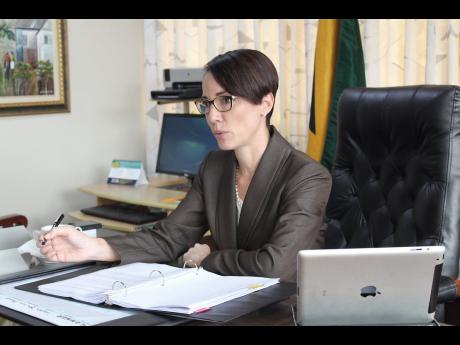Mixed review for Johnson Smith's first 100 days at Foreign Affairs
University lecturer Dr Orville Taylor says Foreign Affairs and Foreign Trade Minister Kamina Johnson Smith should be commended for her engagement of the diaspora so far in her tenure - just over 100 days old - but adds that he needs to "feel the ministry" on other critical issues.
"I don't know whether to give a thumbs up or thumbs down just yet, but I know that the minister has engaged the diaspora community and is also doing it in a bipartisan way, which I find rather significant because it seems somewhat conciliatory," said the lecturer in sociology at the University of the West Indies, Mona.
He is also pleased about work with Cuba, which he says has resulted in a relationship between the two countries that "seems to be on a pretty decent footing".
However, notwithstanding being in office for three months, Taylor says Johnson Smith's ministry needs to be more assertive about policies regarding Venezuela, especially with regard to the PetroCaribe oil agreement and the Caribbean Court of Justice (CCJ).
"I don't know yet what the Jamaican Government is doing in regard to PetroCaribe and the relationship with Venezuela under Nicol·s Maduro and
their (Venezuela's) economic difficulties. I would like to see a much more coherent approach coming from the Jamaican Government," said the academic who writes on the African Diaspora, globalisation, and labour relations.
"I can't say that there is enough to give the ministry a passing grade yet, but it is too early for me to say that they have a failing grade."
Regarding the CCJ, Johnson Smith told The Gleaner in March that the issue was not a priority for the Andrew Holness administration.
DYNAMIC PRESENCE
Meanwhile, according to public commentator Martin Henry, Johnson Smith "is shining at Foreign Affairs ... . In 100 days, the minister has assumed a dynamic presence on the regional and world stage.
"The country has engaged the Africa, Caribbean and Pacific group of states; has smartly engaged a crumbling Venezuela and the PetroCaribe Agreement; and is dealing with the Trinidad and Tobago-Jamaica issues with smooth diplomatic savvy, avoiding the drumbeats of war for boycotts," he wrote in a recent Gleaner column.
The immigration issues that have affected the relationship between Kingston and Port-of-Spain greeted Johnson Smith early on in her tenure.
Those issues may have prompted Trinidad and Tobago's leader Dr Keith Rowley to give notice of a future visit to Jamaica during recent "very frank" talks with Jamaica's prime minister.
Johnson Smith also captured international attention with her appeal at a United Nations General Assembly session on drugs in April for a revisit of the restrictive classification of cannabis under UN conventions.
Near the ending of the symbolic first 100 days in office, Holness gave further intent of his foreign policy push by declaring in the Parliament that Spanish should be Jamaica's second language.
Though that policy push would largely be in line with supporting the Northern Caribbean Economic Convergence, captured in Holness' campaign manifesto, local critics want issues dealing with Patois addressed first, among other things.

